Showing 49–60 of 2647 resultsSorted by latest
-
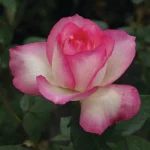
Tourmaline Hybrid Tea Rose 5lt
R200.00Add to cartTourmaline Hybrid Tea Rose 5lt
This rose features shapely, pointed buds that open into elegant, cup-shaped blooms. The unique colour combination of pure white petals edged with soft pink, which gently flows down and fades into white, creates a delicate, romantic effect.
The vigorous bushes produce long, sturdy stems adorned with lush, glossy foliage, making this variety ideal for cut flowers, exhibition, or adding charm to the garden.
Full Sun
Afternoon Sun
Moderate Watering
Monthly Feeding
Prune Every WinterHybrid tea roses are a popular class of roses known for their large, high-centered flowers and long stems. They are a cross between hybrid perpetual roses and tea roses, hence the name “hybrid tea.”
These roses are widely cultivated and admired for their beauty, fragrance, and versatility in various gardening and floral arrangements.Here are some key points about hybrid tea roses:
Appearance
Hybrid tea roses typically have a single flower per stem, with large blooms that often have a distinct spiral shape. The flowers usually have many petals, ranging in color from pure white to shades of pink, red, yellow, and even lavender. They can be single or double-flowered, and their form can vary from classic, high-centered to more open and relaxed.Growth habit
Hybrid tea roses are deciduous shrubs that can grow from 1 to 2m in height, depending on the variety.
They have an upright growth habit with straight stems that make them ideal for cutting and using in floral arrangements.
The leaves are generally dark green and glossy.Fragrance
While hybrid tea roses are prized for their beauty, not all varieties are strongly scented.
Breeders have focused on enhancing the visual characteristics of the flowers, sometimes at the expense of fragrance. However, many hybrid tea roses still retain a delightful fragrance, ranging from mild to intense.Blooming season
Hybrid tea roses bloom throughout the growing season, producing an abundance of flowers. Their peak blooming period varies depending on the climate and specific variety, but it generally occurs during the spring and continues through the summer and autumn months.Care and maintenance
They require regular care to thrive.
They prefer well-drained soil enriched with organic matter and should be planted in a sunny location that receives at least six hours of direct sunlight per day.
Adequate watering, pruning, and fertilizing are essential for their healthy growth.
Pruning in late winter is particularly important to encourage strong stems and shape the plant.Uses
Hybrid tea roses are versatile and can be used in various ways.
They are popular choices for cut flowers, as their long stems and large blooms make them perfect for floral arrangements.
They are also commonly used in formal garden beds, borders, and as accent plants in landscapes.Varieties
There are countless hybrid tea rose varieties available, each with its unique characteristics in terms of color, form, fragrance, and disease resistance.Hybrid tea roses continue to be popular among gardeners, florists, and rose enthusiasts due to their exquisite beauty and versatility. Whether in a vase or in the garden, their elegant blooms bring beauty and fragrance to any setting.
-
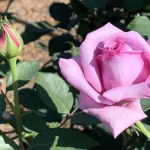
Twice in a Blue Moon Hybrid Tea Rose 5lt
R220.00Add to cartTwice in a Blue Moon TAN 96 138 Hybrid Tea Rose 5lt
Twice in a Blue Moon is an enhanced variety of the classic Blue Moon rose, offering improved health and vigour.
This Hybrid Tea rose is rarely out of bloom, showcasing a prolific second flush with clusters of elegant, spiral-shaped silvery-lilac flowers on tall, upright stems.
Its glossy mid-green foliage complements the blooms beautifully, while its rich fragrance makes it stand out in any garden.
Twice in a Blue MoonIntroduced by Rosen Tantau in 2004, it remains a favourite among blue rose lovers.
Full Sun
Afternoon Sun
Moderate Watering
Monthly Feeding
Prune Every WinterHybrid tea roses are a popular class of roses known for their large, high-centered flowers and long stems. They are a cross between hybrid perpetual roses and tea roses, hence the name “hybrid tea.”
These roses are widely cultivated and admired for their beauty, fragrance, and versatility in various gardening and floral arrangements.Here are some key points about hybrid tea roses:
Appearance
Hybrid tea roses typically have a single flower per stem, with large blooms that often have a distinct spiral shape. The flowers usually have many petals, ranging in color from pure white to shades of pink, red, yellow, and even lavender. They can be single or double-flowered, and their form can vary from classic, high-centered to more open and relaxed.Growth habit
Hybrid tea roses are deciduous shrubs that can grow from 1 to 2m in height, depending on the variety.
They have an upright growth habit with straight stems that make them ideal for cutting and using in floral arrangements.
The leaves are generally dark green and glossy.Fragrance
While hybrid tea roses are prized for their beauty, not all varieties are strongly scented.
Breeders have focused on enhancing the visual characteristics of the flowers, sometimes at the expense of fragrance. However, many hybrid tea roses still retain a delightful fragrance, ranging from mild to intense.Blooming season
Hybrid tea roses bloom throughout the growing season, producing an abundance of flowers. Their peak blooming period varies depending on the climate and specific variety, but it generally occurs during the spring and continues through the summer and autumn months.Care and maintenance
They require regular care to thrive.
They prefer well-drained soil enriched with organic matter and should be planted in a sunny location that receives at least six hours of direct sunlight per day.
Adequate watering, pruning, and fertilizing are essential for their healthy growth.
Pruning in late winter is particularly important to encourage strong stems and shape the plant.Uses
Hybrid tea roses are versatile and can be used in various ways.
They are popular choices for cut flowers, as their long stems and large blooms make them perfect for floral arrangements.
They are also commonly used in formal garden beds, borders, and as accent plants in landscapes.Varieties
There are countless hybrid tea rose varieties available, each with its unique characteristics in terms of color, form, fragrance, and disease resistance.Hybrid tea roses continue to be popular among gardeners, florists, and rose enthusiasts due to their exquisite beauty and versatility. Whether in a vase or in the garden, their elegant blooms bring beauty and fragrance to any setting.
-
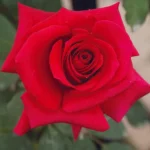
Vanessa Hybrid Tea Rose 5lt
R200.00Add to cartVanessa Hybrid Tea Rose 5lt
Yet another sport of ‘Esther Geldenhuys’. This sport, like its sisters, boasts the same excellent qualities of producing a profusion of perfect star shaped blooms on long stems, in an attractive cherry-red colour. Vigorous & prolific.
Full Sun
Afternoon Sun
Moderate Watering
Monthly Feeding
Prune Every WinterHybrid tea roses are a popular class of roses known for their large, high-centered flowers and long stems. They are a cross between hybrid perpetual roses and tea roses, hence the name “hybrid tea.”
These roses are widely cultivated and admired for their beauty, fragrance, and versatility in various gardening and floral arrangements.Here are some key points about hybrid tea roses:
Appearance
Hybrid tea roses typically have a single flower per stem, with large blooms that often have a distinct spiral shape. The flowers usually have many petals, ranging in color from pure white to shades of pink, red, yellow, and even lavender. They can be single or double-flowered, and their form can vary from classic, high-centered to more open and relaxed.Growth habit
Hybrid tea roses are deciduous shrubs that can grow from 1 to 2m in height, depending on the variety.
They have an upright growth habit with straight stems that make them ideal for cutting and using in floral arrangements.
The leaves are generally dark green and glossy.Fragrance
While hybrid tea roses are prized for their beauty, not all varieties are strongly scented.
Breeders have focused on enhancing the visual characteristics of the flowers, sometimes at the expense of fragrance. However, many hybrid tea roses still retain a delightful fragrance, ranging from mild to intense.Blooming season
Hybrid tea roses bloom throughout the growing season, producing an abundance of flowers. Their peak blooming period varies depending on the climate and specific variety, but it generally occurs during the spring and continues through the summer and autumn months.Care and maintenance
They require regular care to thrive.
They prefer well-drained soil enriched with organic matter and should be planted in a sunny location that receives at least six hours of direct sunlight per day.
Adequate watering, pruning, and fertilizing are essential for their healthy growth.
Pruning in late winter is particularly important to encourage strong stems and shape the plant.Uses
Hybrid tea roses are versatile and can be used in various ways.
They are popular choices for cut flowers, as their long stems and large blooms make them perfect for floral arrangements.
They are also commonly used in formal garden beds, borders, and as accent plants in landscapes.Varieties
There are countless hybrid tea rose varieties available, each with its unique characteristics in terms of color, form, fragrance, and disease resistance.Hybrid tea roses continue to be popular among gardeners, florists, and rose enthusiasts due to their exquisite beauty and versatility. Whether in a vase or in the garden, their elegant blooms bring beauty and fragrance to any setting.
-
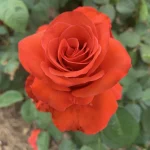
UNISA 150 Mmabatho Hybrid Tea Rose 5lt
R225.00Add to cartUNISA 150 Mmabatho DELtora(P) Hybrid Tea Rose 5lt
To celebrate 150 years of the University of South Africa (UNISA), this rose embodies vibrancy, optimism, and inspiration. Its bright orange blooms mirror the flame of the UNISA crest, symbolising boldness and the transformative power of education.
Firm-petalled buds develop on medium-long stems, producing half-open blooms that eventually reveal a perfectly shaped quartered rosette. The flowers last well in a vase and are complemented by disease-resistant, lush foliage.
The vigorous bush grows neatly to hip height, flowering profusely and maintaining a striking, compact form. Proceeds from this rose will support student funding at UNISA, making it a beautiful and meaningful tribute to the legacy of higher learning in Southern Africa.
Full Sun
Afternoon Sun
Moderate Watering
Monthly Feeding
Prune Every WinterHybrid tea roses are a popular class of roses known for their large, high-centered flowers and long stems. They are a cross between hybrid perpetual roses and tea roses, hence the name “hybrid tea.”
These roses are widely cultivated and admired for their beauty, fragrance, and versatility in various gardening and floral arrangements.Here are some key points about hybrid tea roses:
Appearance
Hybrid tea roses typically have a single flower per stem, with large blooms that often have a distinct spiral shape. The flowers usually have many petals, ranging in color from pure white to shades of pink, red, yellow, and even lavender. They can be single or double-flowered, and their form can vary from classic, high-centered to more open and relaxed.Growth habit
Hybrid tea roses are deciduous shrubs that can grow from 1 to 2m in height, depending on the variety.
They have an upright growth habit with straight stems that make them ideal for cutting and using in floral arrangements.
The leaves are generally dark green and glossy.Fragrance
While hybrid tea roses are prized for their beauty, not all varieties are strongly scented.
Breeders have focused on enhancing the visual characteristics of the flowers, sometimes at the expense of fragrance. However, many hybrid tea roses still retain a delightful fragrance, ranging from mild to intense.Blooming season
Hybrid tea roses bloom throughout the growing season, producing an abundance of flowers. Their peak blooming period varies depending on the climate and specific variety, but it generally occurs during the spring and continues through the summer and autumn months.Care and maintenance
They require regular care to thrive.
They prefer well-drained soil enriched with organic matter and should be planted in a sunny location that receives at least six hours of direct sunlight per day.
Adequate watering, pruning, and fertilizing are essential for their healthy growth.
Pruning in late winter is particularly important to encourage strong stems and shape the plant.Uses
Hybrid tea roses are versatile and can be used in various ways.
They are popular choices for cut flowers, as their long stems and large blooms make them perfect for floral arrangements.
They are also commonly used in formal garden beds, borders, and as accent plants in landscapes.Varieties
There are countless hybrid tea rose varieties available, each with its unique characteristics in terms of color, form, fragrance, and disease resistance.Hybrid tea roses continue to be popular among gardeners, florists, and rose enthusiasts due to their exquisite beauty and versatility. Whether in a vase or in the garden, their elegant blooms bring beauty and fragrance to any setting.
-
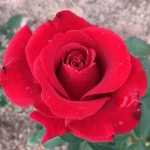
St. Mary’s School Hybrid Tea Rose 5lt
R200.00Add to cartSt. Mary’s School Hybrid Tea Rose 5lt
A red hybrid tea which produces an abundance of medium to long stemmed, shapely blooms in bright, velvet-red.
Full Sun
Afternoon Sun
Moderate Watering
Monthly Feeding
Prune Every WinterHybrid tea roses are a popular class of roses known for their large, high-centered flowers and long stems. They are a cross between hybrid perpetual roses and tea roses, hence the name “hybrid tea.”
These roses are widely cultivated and admired for their beauty, fragrance, and versatility in various gardening and floral arrangements.Here are some key points about hybrid tea roses:
Appearance
Hybrid tea roses typically have a single flower per stem, with large blooms that often have a distinct spiral shape. The flowers usually have many petals, ranging in color from pure white to shades of pink, red, yellow, and even lavender. They can be single or double-flowered, and their form can vary from classic, high-centered to more open and relaxed.Growth habit
Hybrid tea roses are deciduous shrubs that can grow from 1 to 2m in height, depending on the variety.
They have an upright growth habit with straight stems that make them ideal for cutting and using in floral arrangements.
The leaves are generally dark green and glossy.Fragrance
While hybrid tea roses are prized for their beauty, not all varieties are strongly scented.
Breeders have focused on enhancing the visual characteristics of the flowers, sometimes at the expense of fragrance. However, many hybrid tea roses still retain a delightful fragrance, ranging from mild to intense.Blooming season
Hybrid tea roses bloom throughout the growing season, producing an abundance of flowers. Their peak blooming period varies depending on the climate and specific variety, but it generally occurs during the spring and continues through the summer and autumn months.Care and maintenance
They require regular care to thrive.
They prefer well-drained soil enriched with organic matter and should be planted in a sunny location that receives at least six hours of direct sunlight per day.
Adequate watering, pruning, and fertilizing are essential for their healthy growth.
Pruning in late winter is particularly important to encourage strong stems and shape the plant.Uses
Hybrid tea roses are versatile and can be used in various ways.
They are popular choices for cut flowers, as their long stems and large blooms make them perfect for floral arrangements.
They are also commonly used in formal garden beds, borders, and as accent plants in landscapes.Varieties
There are countless hybrid tea rose varieties available, each with its unique characteristics in terms of color, form, fragrance, and disease resistance.Hybrid tea roses continue to be popular among gardeners, florists, and rose enthusiasts due to their exquisite beauty and versatility. Whether in a vase or in the garden, their elegant blooms bring beauty and fragrance to any setting.
-
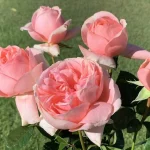
St Ursula Hybrid Tea Rose 5lt
R215.00Add to cartSt Ursula Hybrid Tea Rose 5lt
This Hybrid Tea rose showcases round buds that open slowly into classic half-open blooms, expanding to reveal a deep shallow cup filled with small, firm centre petals. The rich salmon-pink colour remains vibrant throughout every stage of flowering.
A very free-flowering variety, it produces one prominent bloom per stem, adding striking colour to the garden while providing a steady supply of slightly scented flowers for cutting. The glossy, disease-resistant foliage ensures a healthy, low-maintenance plant, perfect for both display and bouquets.
Full Sun
Afternoon Sun
Moderate Watering
Monthly Feeding
Prune Every WinterHybrid tea roses are a popular class of roses known for their large, high-centered flowers and long stems. They are a cross between hybrid perpetual roses and tea roses, hence the name “hybrid tea.”
These roses are widely cultivated and admired for their beauty, fragrance, and versatility in various gardening and floral arrangements.Here are some key points about hybrid tea roses:
Appearance
Hybrid tea roses typically have a single flower per stem, with large blooms that often have a distinct spiral shape. The flowers usually have many petals, ranging in color from pure white to shades of pink, red, yellow, and even lavender. They can be single or double-flowered, and their form can vary from classic, high-centered to more open and relaxed.Growth habit
Hybrid tea roses are deciduous shrubs that can grow from 1 to 2m in height, depending on the variety.
They have an upright growth habit with straight stems that make them ideal for cutting and using in floral arrangements.
The leaves are generally dark green and glossy.Fragrance
While hybrid tea roses are prized for their beauty, not all varieties are strongly scented.
Breeders have focused on enhancing the visual characteristics of the flowers, sometimes at the expense of fragrance. However, many hybrid tea roses still retain a delightful fragrance, ranging from mild to intense.Blooming season
Hybrid tea roses bloom throughout the growing season, producing an abundance of flowers. Their peak blooming period varies depending on the climate and specific variety, but it generally occurs during the spring and continues through the summer and autumn months.Care and maintenance
They require regular care to thrive.
They prefer well-drained soil enriched with organic matter and should be planted in a sunny location that receives at least six hours of direct sunlight per day.
Adequate watering, pruning, and fertilizing are essential for their healthy growth.
Pruning in late winter is particularly important to encourage strong stems and shape the plant.Uses
Hybrid tea roses are versatile and can be used in various ways.
They are popular choices for cut flowers, as their long stems and large blooms make them perfect for floral arrangements.
They are also commonly used in formal garden beds, borders, and as accent plants in landscapes.Varieties
There are countless hybrid tea rose varieties available, each with its unique characteristics in terms of color, form, fragrance, and disease resistance.Hybrid tea roses continue to be popular among gardeners, florists, and rose enthusiasts due to their exquisite beauty and versatility. Whether in a vase or in the garden, their elegant blooms bring beauty and fragrance to any setting.
-
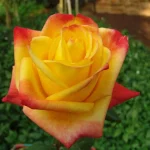
Sun City Hybrid Tea Rose 5lt
R210.00Add to cartSun City Hybrid Tea Rose 5lt
It was only natural that this rose be registered under the name ‘Sun City’.
The dazzling colour combination of deep yellow with luminous orange-red cannot distract from the fashionably high, urn shaped buds held upright on strong stems.
The petals are of such incredible firmness that they hold their crisp shape until they eventually have to be removed.
Full Sun
Afternoon Sun
Moderate Watering
Monthly Feeding
Prune Every WinterHybrid tea roses are a popular class of roses known for their large, high-centered flowers and long stems. They are a cross between hybrid perpetual roses and tea roses, hence the name “hybrid tea.”
These roses are widely cultivated and admired for their beauty, fragrance, and versatility in various gardening and floral arrangements.Here are some key points about hybrid tea roses:
Appearance
Hybrid tea roses typically have a single flower per stem, with large blooms that often have a distinct spiral shape. The flowers usually have many petals, ranging in color from pure white to shades of pink, red, yellow, and even lavender. They can be single or double-flowered, and their form can vary from classic, high-centered to more open and relaxed.Growth habit
Hybrid tea roses are deciduous shrubs that can grow from 1 to 2m in height, depending on the variety.
They have an upright growth habit with straight stems that make them ideal for cutting and using in floral arrangements.
The leaves are generally dark green and glossy.Fragrance
While hybrid tea roses are prized for their beauty, not all varieties are strongly scented.
Breeders have focused on enhancing the visual characteristics of the flowers, sometimes at the expense of fragrance. However, many hybrid tea roses still retain a delightful fragrance, ranging from mild to intense.Blooming season
Hybrid tea roses bloom throughout the growing season, producing an abundance of flowers. Their peak blooming period varies depending on the climate and specific variety, but it generally occurs during the spring and continues through the summer and autumn months.Care and maintenance
They require regular care to thrive.
They prefer well-drained soil enriched with organic matter and should be planted in a sunny location that receives at least six hours of direct sunlight per day.
Adequate watering, pruning, and fertilizing are essential for their healthy growth.
Pruning in late winter is particularly important to encourage strong stems and shape the plant.Uses
Hybrid tea roses are versatile and can be used in various ways.
They are popular choices for cut flowers, as their long stems and large blooms make them perfect for floral arrangements.
They are also commonly used in formal garden beds, borders, and as accent plants in landscapes.Varieties
There are countless hybrid tea rose varieties available, each with its unique characteristics in terms of color, form, fragrance, and disease resistance.Hybrid tea roses continue to be popular among gardeners, florists, and rose enthusiasts due to their exquisite beauty and versatility. Whether in a vase or in the garden, their elegant blooms bring beauty and fragrance to any setting.
-
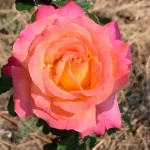
Sundowner Hybrid Tea Rose 5lt
R215.00Add to cartSundowner LUDcojubi(P) Hybrid Tea Rose 5lt
This rose evokes the relaxed, serene feeling of enjoying a sundowner on your stoep. From pointed buds, the firm petals unfold to reveal a warm mélange of yellow to apricot-orange, deepening to a red edging when kissed by the sun.
The medium-sized blooms are borne on straight, balanced stems adorned with lush green foliage, making them ideal for cut flowers with excellent vase life.
Full Sun
Afternoon Sun
Moderate Watering
Monthly Feeding
Prune Every WinterHybrid tea roses are a popular class of roses known for their large, high-centered flowers and long stems. They are a cross between hybrid perpetual roses and tea roses, hence the name “hybrid tea.”
These roses are widely cultivated and admired for their beauty, fragrance, and versatility in various gardening and floral arrangements.Here are some key points about hybrid tea roses:
Appearance
Hybrid tea roses typically have a single flower per stem, with large blooms that often have a distinct spiral shape. The flowers usually have many petals, ranging in color from pure white to shades of pink, red, yellow, and even lavender. They can be single or double-flowered, and their form can vary from classic, high-centered to more open and relaxed.Growth habit
Hybrid tea roses are deciduous shrubs that can grow from 1 to 2m in height, depending on the variety.
They have an upright growth habit with straight stems that make them ideal for cutting and using in floral arrangements.
The leaves are generally dark green and glossy.Fragrance
While hybrid tea roses are prized for their beauty, not all varieties are strongly scented.
Breeders have focused on enhancing the visual characteristics of the flowers, sometimes at the expense of fragrance. However, many hybrid tea roses still retain a delightful fragrance, ranging from mild to intense.Blooming season
Hybrid tea roses bloom throughout the growing season, producing an abundance of flowers. Their peak blooming period varies depending on the climate and specific variety, but it generally occurs during the spring and continues through the summer and autumn months.Care and maintenance
They require regular care to thrive.
They prefer well-drained soil enriched with organic matter and should be planted in a sunny location that receives at least six hours of direct sunlight per day.
Adequate watering, pruning, and fertilizing are essential for their healthy growth.
Pruning in late winter is particularly important to encourage strong stems and shape the plant.Uses
Hybrid tea roses are versatile and can be used in various ways.
They are popular choices for cut flowers, as their long stems and large blooms make them perfect for floral arrangements.
They are also commonly used in formal garden beds, borders, and as accent plants in landscapes.Varieties
There are countless hybrid tea rose varieties available, each with its unique characteristics in terms of color, form, fragrance, and disease resistance.Hybrid tea roses continue to be popular among gardeners, florists, and rose enthusiasts due to their exquisite beauty and versatility. Whether in a vase or in the garden, their elegant blooms bring beauty and fragrance to any setting.
With a neat upright growth habit, willing re-sprouting, and low maintenance requirements, the Sundowner rose is both a stunning garden performer and a joy to display indoors.
-
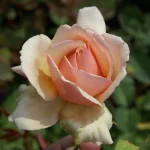
Tanned Beauty Hybrid Tea Rose 5lt
R200.00Add to cartTanned Beauty Hybrid Tea Rose 5lt
Long buds develop into elegant, half open blooms with a sharply pointed centre; basic cream with a deep tan on the reverse. The bush is vigorous & produces long stemmed, highly perfumed cut flowers all season long.
Full Sun
Afternoon Sun
Moderate Watering
Monthly Feeding
Prune Every WinterHybrid tea roses are a popular class of roses known for their large, high-centered flowers and long stems. They are a cross between hybrid perpetual roses and tea roses, hence the name “hybrid tea.”
These roses are widely cultivated and admired for their beauty, fragrance, and versatility in various gardening and floral arrangements.Here are some key points about hybrid tea roses:
Appearance
Hybrid tea roses typically have a single flower per stem, with large blooms that often have a distinct spiral shape. The flowers usually have many petals, ranging in color from pure white to shades of pink, red, yellow, and even lavender. They can be single or double-flowered, and their form can vary from classic, high-centered to more open and relaxed.Growth habit
Hybrid tea roses are deciduous shrubs that can grow from 1 to 2m in height, depending on the variety.
They have an upright growth habit with straight stems that make them ideal for cutting and using in floral arrangements.
The leaves are generally dark green and glossy.Fragrance
While hybrid tea roses are prized for their beauty, not all varieties are strongly scented.
Breeders have focused on enhancing the visual characteristics of the flowers, sometimes at the expense of fragrance. However, many hybrid tea roses still retain a delightful fragrance, ranging from mild to intense.Blooming season
Hybrid tea roses bloom throughout the growing season, producing an abundance of flowers. Their peak blooming period varies depending on the climate and specific variety, but it generally occurs during the spring and continues through the summer and autumn months.Care and maintenance
They require regular care to thrive.
They prefer well-drained soil enriched with organic matter and should be planted in a sunny location that receives at least six hours of direct sunlight per day.
Adequate watering, pruning, and fertilizing are essential for their healthy growth.
Pruning in late winter is particularly important to encourage strong stems and shape the plant.Uses
Hybrid tea roses are versatile and can be used in various ways.
They are popular choices for cut flowers, as their long stems and large blooms make them perfect for floral arrangements.
They are also commonly used in formal garden beds, borders, and as accent plants in landscapes.Varieties
There are countless hybrid tea rose varieties available, each with its unique characteristics in terms of color, form, fragrance, and disease resistance.Hybrid tea roses continue to be popular among gardeners, florists, and rose enthusiasts due to their exquisite beauty and versatility. Whether in a vase or in the garden, their elegant blooms bring beauty and fragrance to any setting.
-
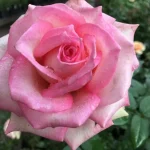
Table Mountain Hybrid Tea Rose 5lt
R200.00Add to cartTable Mountain Hybrid Tea Rose 5lt
The ‘Table Mountain’ rose is a striking Hybrid Tea prized for its large, perfectly shaped, high-pointed blooms. Its unique colour combination — green-tinted outer petals, crisp white centers, and delicate pink edges with subtle green highlights — makes it a standout for florists and gardeners alike.
The vigorous bush produces flush after flush of flawless blooms on sturdy stems, ensuring continuous colour and charm in the garden or as cut flowers.
Full Sun
Afternoon Sun
Moderate Watering
Monthly Feeding
Prune Every WinterHybrid tea roses are a popular class of roses known for their large, high-centered flowers and long stems. They are a cross between hybrid perpetual roses and tea roses, hence the name “hybrid tea.”
These roses are widely cultivated and admired for their beauty, fragrance, and versatility in various gardening and floral arrangements.Here are some key points about hybrid tea roses:
Appearance
Hybrid tea roses typically have a single flower per stem, with large blooms that often have a distinct spiral shape. The flowers usually have many petals, ranging in color from pure white to shades of pink, red, yellow, and even lavender. They can be single or double-flowered, and their form can vary from classic, high-centered to more open and relaxed.Growth habit
Hybrid tea roses are deciduous shrubs that can grow from 1 to 2m in height, depending on the variety.
They have an upright growth habit with straight stems that make them ideal for cutting and using in floral arrangements.
The leaves are generally dark green and glossy.Fragrance
While hybrid tea roses are prized for their beauty, not all varieties are strongly scented.
Breeders have focused on enhancing the visual characteristics of the flowers, sometimes at the expense of fragrance. However, many hybrid tea roses still retain a delightful fragrance, ranging from mild to intense.Blooming season
Hybrid tea roses bloom throughout the growing season, producing an abundance of flowers. Their peak blooming period varies depending on the climate and specific variety, but it generally occurs during the spring and continues through the summer and autumn months.Care and maintenance
They require regular care to thrive.
They prefer well-drained soil enriched with organic matter and should be planted in a sunny location that receives at least six hours of direct sunlight per day.
Adequate watering, pruning, and fertilizing are essential for their healthy growth.
Pruning in late winter is particularly important to encourage strong stems and shape the plant.Uses
Hybrid tea roses are versatile and can be used in various ways.
They are popular choices for cut flowers, as their long stems and large blooms make them perfect for floral arrangements.
They are also commonly used in formal garden beds, borders, and as accent plants in landscapes.Varieties
There are countless hybrid tea rose varieties available, each with its unique characteristics in terms of color, form, fragrance, and disease resistance.Hybrid tea roses continue to be popular among gardeners, florists, and rose enthusiasts due to their exquisite beauty and versatility. Whether in a vase or in the garden, their elegant blooms bring beauty and fragrance to any setting.
-
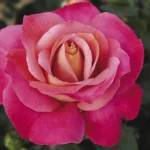
Surina Hybrid Tea Rose 5lt
R215.00Add to cartSurina Hybrid Tea Rose 5lt
A wedding present for Surina Knott-Craig. A classic hybrid tea which excels as a long lasting, firm stemmed cut rose & a strong rival for the “best rose on show”.
A glowing orange-pink flowing from the petal edges over the basic cream with prominent veins, adds distinctiveness.
Full Sun
Afternoon Sun
Moderate Watering
Monthly Feeding
Prune Every WinterHybrid tea roses are a popular class of roses known for their large, high-centered flowers and long stems. They are a cross between hybrid perpetual roses and tea roses, hence the name “hybrid tea.”
These roses are widely cultivated and admired for their beauty, fragrance, and versatility in various gardening and floral arrangements.Here are some key points about hybrid tea roses:
Appearance
Hybrid tea roses typically have a single flower per stem, with large blooms that often have a distinct spiral shape. The flowers usually have many petals, ranging in color from pure white to shades of pink, red, yellow, and even lavender. They can be single or double-flowered, and their form can vary from classic, high-centered to more open and relaxed.Growth habit
Hybrid tea roses are deciduous shrubs that can grow from 1 to 2m in height, depending on the variety.
They have an upright growth habit with straight stems that make them ideal for cutting and using in floral arrangements.
The leaves are generally dark green and glossy.Fragrance
While hybrid tea roses are prized for their beauty, not all varieties are strongly scented.
Breeders have focused on enhancing the visual characteristics of the flowers, sometimes at the expense of fragrance. However, many hybrid tea roses still retain a delightful fragrance, ranging from mild to intense.Blooming season
Hybrid tea roses bloom throughout the growing season, producing an abundance of flowers. Their peak blooming period varies depending on the climate and specific variety, but it generally occurs during the spring and continues through the summer and autumn months.Care and maintenance
They require regular care to thrive.
They prefer well-drained soil enriched with organic matter and should be planted in a sunny location that receives at least six hours of direct sunlight per day.
Adequate watering, pruning, and fertilizing are essential for their healthy growth.
Pruning in late winter is particularly important to encourage strong stems and shape the plant.Uses
Hybrid tea roses are versatile and can be used in various ways.
They are popular choices for cut flowers, as their long stems and large blooms make them perfect for floral arrangements.
They are also commonly used in formal garden beds, borders, and as accent plants in landscapes.Varieties
There are countless hybrid tea rose varieties available, each with its unique characteristics in terms of color, form, fragrance, and disease resistance.Hybrid tea roses continue to be popular among gardeners, florists, and rose enthusiasts due to their exquisite beauty and versatility. Whether in a vase or in the garden, their elegant blooms bring beauty and fragrance to any setting.
-
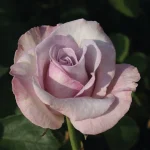
Super Bowl Hybrid Tea Rose 5lt
R200.00Add to cartSuper Bowl Hybrid Tea Rose 5lt
This rose produces large, fragrant, exhibition-shaped blooms on medium to long stems, showcasing a pale silver-lilac hue with fascinating undertones that set it apart from typical “blue” roses.
A prolific and healthy grower, it is a unique cross between ‘Harmonie’ and ‘Blue Ribbon’, offering both visual beauty and captivating fragrance. Ideal for cut flowers, exhibitions, or adding a distinctive touch to the garden.
Full Sun
Afternoon Sun
Moderate Watering
Monthly Feeding
Prune Every WinterHybrid tea roses are a popular class of roses known for their large, high-centered flowers and long stems. They are a cross between hybrid perpetual roses and tea roses, hence the name “hybrid tea.”
These roses are widely cultivated and admired for their beauty, fragrance, and versatility in various gardening and floral arrangements.Here are some key points about hybrid tea roses:
Appearance
Hybrid tea roses typically have a single flower per stem, with large blooms that often have a distinct spiral shape. The flowers usually have many petals, ranging in color from pure white to shades of pink, red, yellow, and even lavender. They can be single or double-flowered, and their form can vary from classic, high-centered to more open and relaxed.Growth habit
Hybrid tea roses are deciduous shrubs that can grow from 1 to 2m in height, depending on the variety.
They have an upright growth habit with straight stems that make them ideal for cutting and using in floral arrangements.
The leaves are generally dark green and glossy.Fragrance
While hybrid tea roses are prized for their beauty, not all varieties are strongly scented.
Breeders have focused on enhancing the visual characteristics of the flowers, sometimes at the expense of fragrance. However, many hybrid tea roses still retain a delightful fragrance, ranging from mild to intense.Blooming season
Hybrid tea roses bloom throughout the growing season, producing an abundance of flowers. Their peak blooming period varies depending on the climate and specific variety, but it generally occurs during the spring and continues through the summer and autumn months.Care and maintenance
They require regular care to thrive.
They prefer well-drained soil enriched with organic matter and should be planted in a sunny location that receives at least six hours of direct sunlight per day.
Adequate watering, pruning, and fertilizing are essential for their healthy growth.
Pruning in late winter is particularly important to encourage strong stems and shape the plant.Uses
Hybrid tea roses are versatile and can be used in various ways.
They are popular choices for cut flowers, as their long stems and large blooms make them perfect for floral arrangements.
They are also commonly used in formal garden beds, borders, and as accent plants in landscapes.Varieties
There are countless hybrid tea rose varieties available, each with its unique characteristics in terms of color, form, fragrance, and disease resistance.Hybrid tea roses continue to be popular among gardeners, florists, and rose enthusiasts due to their exquisite beauty and versatility. Whether in a vase or in the garden, their elegant blooms bring beauty and fragrance to any setting.
